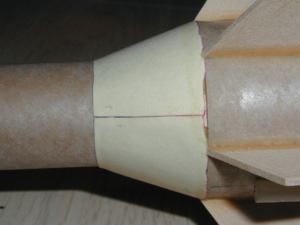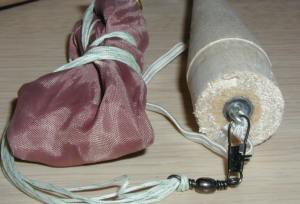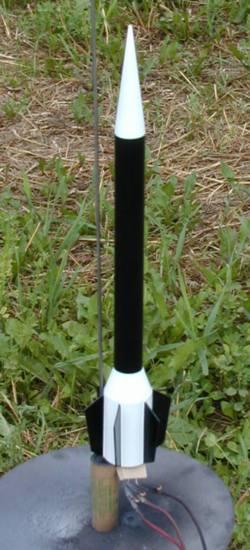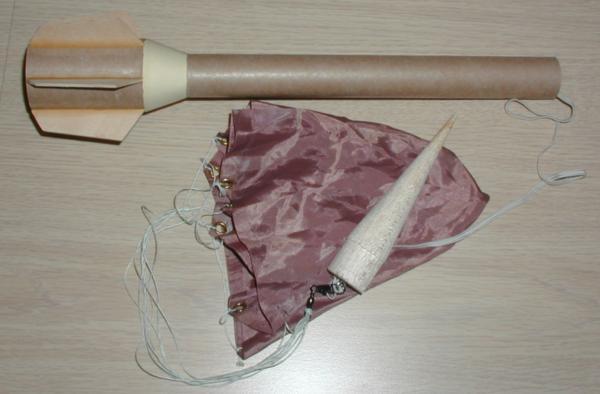| Published: | 2010-11-13 |
| Manufacturer: | True Modeler's Rocket Kits  |
![[Picture]](/images/archive/images/ratings/rating_tmrk_merlin.gif) (01/14/03) I was successful in
getting another rocket built and flown in these winter months, but it had to be
unpainted due to the cold. I was glad to get this rocket as a Descon 10 prize
from my
Push-Me,
Pull-Me (a DC Gemini Kit-Bash). The True Modeler's Rocket Kit (TMRK),
Merlin. It has been a rocket that I have been wanting for a while due to its
unique 6-fin and transition design. I have build TMRK's
Triple
Zip three rocket kit, but this one will take a bit more skill.
(01/14/03) I was successful in
getting another rocket built and flown in these winter months, but it had to be
unpainted due to the cold. I was glad to get this rocket as a Descon 10 prize
from my
Push-Me,
Pull-Me (a DC Gemini Kit-Bash). The True Modeler's Rocket Kit (TMRK),
Merlin. It has been a rocket that I have been wanting for a while due to its
unique 6-fin and transition design. I have build TMRK's
Triple
Zip three rocket kit, but this one will take a bit more skill.
My Image exported from
RockSim 
The rocket parts were neatly packaged into a narrow plastic bag with placard showing a picture of the rocket, several highlights (Unique 6-Fin Design, 12" Synthetic 'Chute, Flights to Over 1,000 FT), Skill Level 3, Length, Diameter and recommended motors. All the pieces were packaged very nicely and separated as appropriate.
TMRK explains their objective as taking "... you back to a time when model rockets were more than just a pointed tube and a couple fins. You will not find any ready-to-fly, or even almost-ready-to-fly kits here. Our kits are for the hobbyist that enjoys building and displaying their rockets as much as they do flying and recovering them." The Merlin is in line with their objective and for me is the first kit that I had to form the transition from paper for.
The Merlin stands 16.25" tall (although my rocket measured 15.75") with the lower section diameter of 1.637" (BT-60) and the upper section 0.976" (BT-50). The kit comes with a lower body tube that is 2.5" long, and upper body tube that is 11.25" long (1.75" is in the lower tube and 1" is under the paper transition) and a balsa nose cone that is conical (pointed) and 3.75" long. It comes with the centering rings, thrust ring and tube for an 18mm motor mount. The fin stock is 1/16" Bass wood. The recovery system included an eye-screw for the nose cone, 18" of flat 1/8" elastic, a synthetic 12" parachute (brown), and two snap swivels. There is a card-stock template for the fin marking guide, fins and two transitions. A 1/8" launch lug, nose weight, and short BT-60 coupler wraps up the kit.
CONSTRUCTION:
The instructions in 5-pages of step-by-step instruction. There are many supporting illustrations in the right column to assist the builder in completing the rocket. It is rated a skill-level 3 which is reasonable. The instructions recommend white glue, but suggests yellow carpenters glue for a more durable rocket. I used Elmer's Carpenter's Wood Glue (exterior). The instructions include a couple of paragraphs on finishing and flying as well as the assembly of the rocket. You will need your standard rocket building tools, including a sharp hobby knife.
Assembly starts with the motor mount. The two 18mm to 24mm centering rings are glued to the 18mm tube, a thrust ring in glued in place. There is not motor retention hook on this rocket. In a later step, the motor mount is installed into the upper body tube where it extends down into the lower body tube.
The next steps get the two body tubes together. The BT-60 coupler is inserted into the lower body tube leaving just 1/32" exposed (later to be used for the transition . . . a well, thought-out technique). A black fiberboard centering ring is slid up from the bottom to rest against the coupler. A second black fiberboard centering ring is attached to the upper body tube's bottom. The upper body tube is then inserted from the bottom up into the lower body tube to a prescribed point. This prescribed point was in question, because in step 2E is has you mark the tube at 1.75" and the illustration agrees. In step 3K it says to apply a bead of glue just above the 1.75" mark and then says to insert and slide it up just until the 2" mark is visible above the upper centering ring. The 3K illustration matches the 1.75" indication, while the 3L illustration shows 2". Based on on this, I used the 1.75" mark.
The fins are then cut from the 1/16" bass wood using a card-stock template and a supplemental guide to show you fin layout on the bass wood provided. Very nice wood to work with. The fins are cut, stacked and shaped. The instructions suggest to perhaps fins the fins now with sanding sealer and sanding.
 Next, comes card-stock transition. It is cut out in
two pieces. The actual transition (wrapper) and a gluing tab. The gluing tab
prevent an overlap-bump that comes from a single-piece transition template. The
transition is assembled, which is relatively easy, and then fitted on the body
tube. Glue is applied to the upper body tube and on that exposed 1/32" of
the BT-60 coupler. The transition is slide down from the top to meet the glue.
The extended BT-60 coupler is a nice foundation for the transition. (NOTE:
there are two transition templates on the card-stock so if you make a mistake,
you're covered.
Next, comes card-stock transition. It is cut out in
two pieces. The actual transition (wrapper) and a gluing tab. The gluing tab
prevent an overlap-bump that comes from a single-piece transition template. The
transition is assembled, which is relatively easy, and then fitted on the body
tube. Glue is applied to the upper body tube and on that exposed 1/32" of
the BT-60 coupler. The transition is slide down from the top to meet the glue.
The extended BT-60 coupler is a nice foundation for the transition. (NOTE:
there are two transition templates on the card-stock so if you make a mistake,
you're covered.
 The nose cone was a new and unique building experience
for me. You need to install nose weight in the form of a piece of cone-shaped
lead. You make a point in the nose cone per the instructions with a pencil. You
then press the nose cone down on this cone-shaped piece of lead. You remove the
lead piece from the nose cone. By holding the lead, you screw the eye-screw
into and and then remove it again. Now, you use CA to glue the lead into the
nose cone. Then, drop CA into the thread hole you just made and screw in the
eye-screw. Then you "wick" CA into and around the nose weight.
The nose cone was a new and unique building experience
for me. You need to install nose weight in the form of a piece of cone-shaped
lead. You make a point in the nose cone per the instructions with a pencil. You
then press the nose cone down on this cone-shaped piece of lead. You remove the
lead piece from the nose cone. By holding the lead, you screw the eye-screw
into and and then remove it again. Now, you use CA to glue the lead into the
nose cone. Then, drop CA into the thread hole you just made and screw in the
eye-screw. Then you "wick" CA into and around the nose weight.
The fins are attached after marking the tube with the fin marking guide.
 Lastly the elastic shock cord is attached using a
3-fold paper method. There were supposed to be two snap swivels in the kit, but
I could only find one (it is entirely possible that I lost it since I had this
kit in and out of the bag a number of times prior to deciding to build it). The
two swivels were to attach the shock cord and parachute to the nose
cone.
Lastly the elastic shock cord is attached using a
3-fold paper method. There were supposed to be two snap swivels in the kit, but
I could only find one (it is entirely possible that I lost it since I had this
kit in and out of the bag a number of times prior to deciding to build it). The
two swivels were to attach the shock cord and parachute to the nose
cone.
A comment on the parachute: TMRK indicates that it is an ultra-lightweight, rip-resistant synthetic material which is only 2/3rds the weight of nylon. It includes lightweight aluminum grommets for attaching the shroud lines. The parachute is 8-sided as opposed to the 6-sided parachutes most manufacturers offer.
As I said above, I missed my painting opportunity due to the cold of winter. I will finish it later and update the review. Finishing will be modeler's choice and the kit does not come with any decals.
Update: Well, as you can see, I have been able to finish the rocket. I had a paint reaction with the white around the fines. It is barely noticeable. The look is nice with the transitions and 6 fins!
Overall, for CONSTRUCTION I would rate this kit 3 ½ points. The instructions described the assembly process well and included illustrations. The balsa nose cone tip is very fragile. Be sure to soak it with CA to firm it up. The bass wood and other parts were of good quality. It is missing a motor hook and decals.
 FLIGHT/RECOVERY:
FLIGHT/RECOVERY:
TMRK recommends the 1/2A6-2, A8-3, B6-4 (first flight), C6-5 or D10-7 (Apogee) for flying the Merlin. TMRK's website adds the B4-4 motor. Also, TMRK's website says the Merlin should weigh 1.55 ounces. My unfinished rocket weighed 1.5 ounces.
Flight preparation includes friction fitting the motor in place and using adequate wadding to protect the parachute. The parachute is thin and folds nicely, however, the eyelets make the bottom rather thick. It actually doesn't fit into the body tube if care isn't taken for those eyelets. I found that I could only fold the 'chute in half (from top to bottom) and not in thirds. Then I slide the 'chute slightly so half the eyelets are slightly above in the others. Then wrap the shroud lines around the 'chute. It works.
For the first flight I used a 13mm A10-3 motor. Yes, I wrapped it with masking tape until it fit. It turned in a very nice performance and the rocket flew very straight. Ejection was at apogee and descent on the 12" parachute was graceful.
 I liked the A10 so much that I made an adapter out of
an expended 18mm motor. I added a motor hook to the adapter so that it would
retain 13mm motors. I friction fit the adapter into the motor mount. The second
flight was on an A10-3, too. A repeat of the first flight. However, this time
we saw evidence of the short elastic shock cord. I caused the nose cone to kick
back and hit the top if the rocket. It put a nice indentation into the shoulder
of the rocket.
I liked the A10 so much that I made an adapter out of
an expended 18mm motor. I added a motor hook to the adapter so that it would
retain 13mm motors. I friction fit the adapter into the motor mount. The second
flight was on an A10-3, too. A repeat of the first flight. However, this time
we saw evidence of the short elastic shock cord. I caused the nose cone to kick
back and hit the top if the rocket. It put a nice indentation into the shoulder
of the rocket.
The third flight was on an A8-3. This too, is a good match. No, there is not a lot of altitude, may 200 feet, however it gives good flights to watch and recover.
 I will fly
this one on B's and C's, but need a bigger field first. To the left is the
results from my RockSim file.
I will fly
this one on B's and C's, but need a bigger field first. To the left is the
results from my RockSim file.
For FLIGHT/RECOVERY, I would rate this kit 4 points. The Merlin flies very well and straight. It is fast because it is so light. The shock cord proved itself to be a problem and should be fixed. The parachute's quality is great but a bit troublesome to get into the body tube. I'd rather have it this way than a plastic 'chute though, so don't take this as a large negative. Motor retention was mentioned above.

I give the kit an OVERALL rating of 4 points. TMRK has done a good job putting together this rocket and it would be a nice change for someone that just builds Estes or Quest rockets. The 6-fin, transitioning design is unique and enjoyable to build. I'm looking forward to painting it with very bright colors and putting it into the air with some C power!
 |
 |
Flights
 |
 |
 |
 |
M.K. (September 21, 2008)